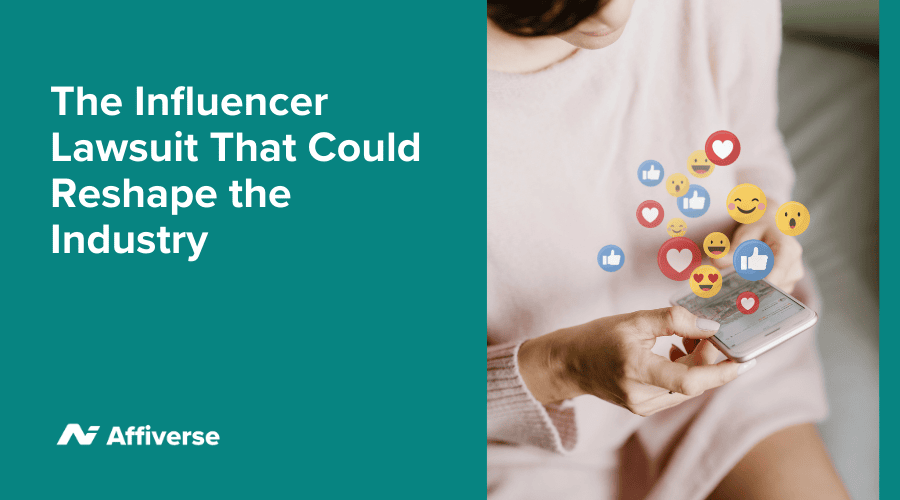The Influencer Lawsuit That Could Reshape the Industry

A legal battle between two influencers has sparked debates that could change the influencer marketing landscape. Alyssa Sheil and Sydney Nicole Gifford, prominent creators in the Amazon influencer space, are embroiled in a lawsuit over alleged content copying.
The case has captured attention not only for its personal stakes but also for its potential to set legal precedents on content originality and copyright in the influencer economy.
Here’s what you need to know about the case and what it could mean for influencers, brands, and affiliate marketers.
The heart of the dispute
The conflict centres around Sheil’s claim that Gifford copied her content, including styling choices, set designs, and video presentation. Both influencers operate in the “clean aesthetic” niche, known for its minimalist and curated approach to showcasing products. With millions of followers and significant revenue generated through Amazon’s affiliate program, the stakes are high for both parties.
Sheil alleges that Gifford’s work too closely mirrors her own, diluting her brand identity and confusing audiences. Gifford, on the other hand, denies the allegations and argues that shared trends within a niche cannot be equated to plagiarism.
This lawsuit raises critical questions about what constitutes originality in an industry where trends are often shared and replicated. Can common aesthetics and styles be copyrighted? And where is the line between inspiration and imitation?
Why this matters for influencers and affiliates
At its core, this case highlights the challenges influencers and affiliates face in navigating intellectual property rights in a rapidly growing industry. While the influencer economy thrives on creativity, the boundaries of originality and ownership remain blurry.
1. Defining originality in a saturated market
Many influencers work within popular niches that rely on shared aesthetics, whether it’s fitness, fashion, or tech. This case could establish clearer guidelines on what distinguishes inspiration from infringement, forcing creators to rethink how they differentiate their content.
2. Implications for brand partnerships
For brands and affiliate programs, partnerships with influencers are built on trust and the assumption of unique value. If content copying becomes a legal grey area, brands may need to vet creators more rigorously to ensure their marketing campaigns maintain authenticity and originality.
3. Impact on affiliate earnings
Influencers in affiliate programs like Amazon’s earn commissions by driving sales through their personalised content. If lawsuits like this discourage creativity or lead to stricter content regulations, it could affect the flow of new ideas that drive consumer engagement and, ultimately, sales.
What this means for brands
The lawsuit is a wake-up call for brands working with influencers to establish clearer guidelines and expectations. Here’s how brands might adapt:
1. More rigorous vetting
Brands may invest in tools or teams to evaluate the originality of an influencer’s portfolio before partnerships. This could include analysing whether their style, themes, or audience engagement aligns with existing brand values.
2. Legal safeguards
Contracts may include clauses that protect brands from liability in cases of content disputes. For instance, agreements might require influencers to certify that their content is original and not derived from another creator.
3. Encouraging individuality
Brands may prioritise influencers who bring unique perspectives or styles to campaigns, avoiding creators who follow overly similar trends.
Lessons for influencers and affiliates
This case underscores the importance of carving out a distinctive identity in a crowded market. Here’s how influencers and affiliates can protect themselves and thrive in this evolving environment:
1. Create a unique voice
Developing a signature style or voice can help distinguish your content from competitors. Whether it’s through storytelling, humour, or a specific production style, focusing on authenticity builds loyalty and trust with your audience.
2. Document your process
Keeping records of your creative process, from brainstorming to execution, can provide evidence of originality if disputes arise. This is particularly important for influencers working in niches where trends often overlap.
3. Be transparent about inspiration
If your work is influenced by another creator, acknowledge it. Giving credit where it’s due not only builds goodwill but also reduces the likelihood of misunderstandings or legal issues.
4. Understand copyright laws
Influencers should educate themselves on copyright and intellectual property laws. Knowing what’s protected and what’s fair game can help avoid costly mistakes.
The road ahead
The outcome of this lawsuit could set important legal precedents for the influencer marketing industry. If the court rules in favour of stricter definitions of originality, influencers may need to rethink how they create content, while brands could face added pressure to ensure their campaigns meet higher ethical and legal standards.
For affiliates, this case is a reminder of the value of authenticity. In a world where consumer trust is paramount, standing out with genuine, creative content is more important than ever.
The influencer economy is built on creativity, connection, and trust. As the industry matures, the lines between inspiration and imitation will need to become clearer—not just for influencers, but for the brands and audiences who rely on them.
This case might just be the beginning of a larger conversation about how we define originality in the digital age.






